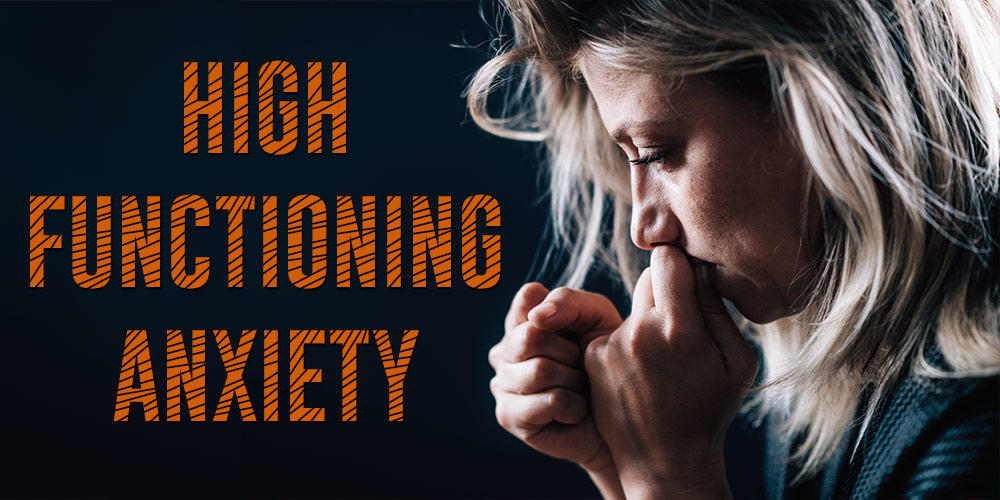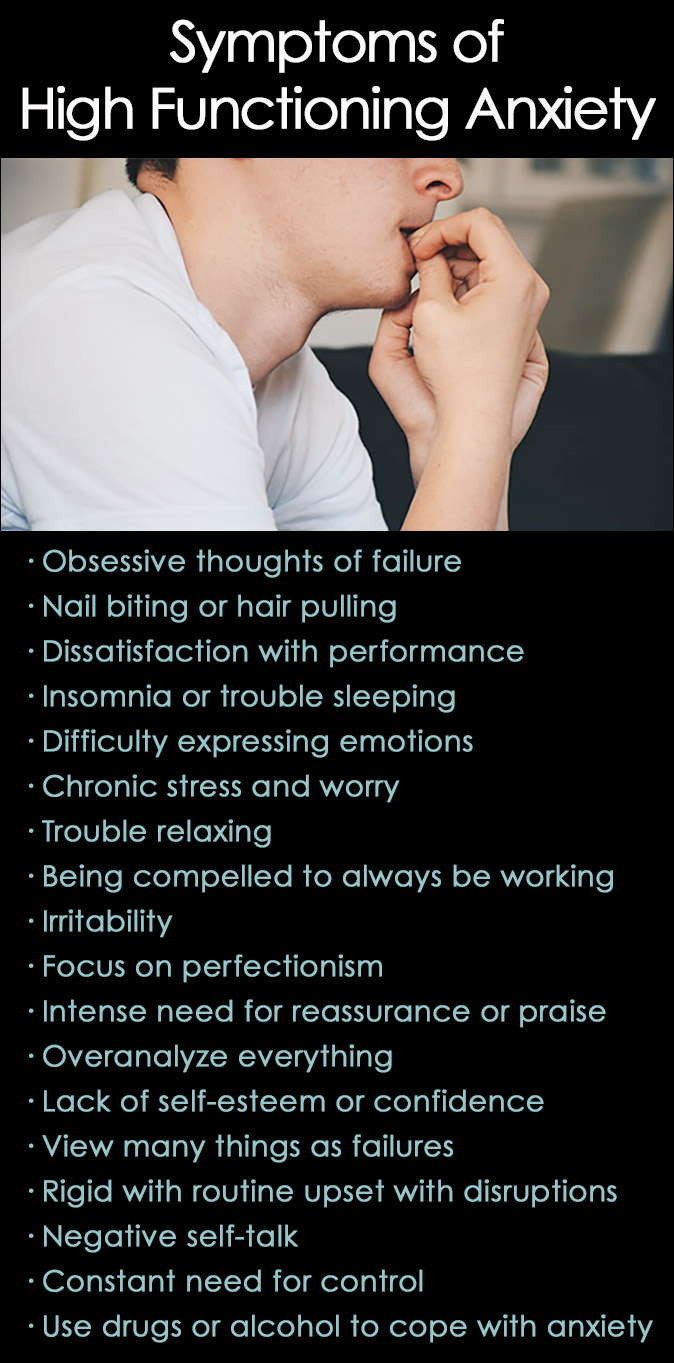
Anxiety disorders are the most common form of mental illness in the United States. They come in many forms and each individual experiences them differently, but one type that often goes unnoticed is referred to as high-functioning anxiety or functional anxiety.
It is normal to feel anxious unless a high level of anxiety interferes with daily activities.
People with high-functioning anxiety are often high achievers who strive to succeed in everything they do. They are sometimes described as “Type-A workaholics” or “perfectionists” who internally struggle with anxiety symptoms while maintaining a high level of functionality at work or school.
While these terms are meant as a form of praise, many times there is a lot more going on than meets the eye and they are good at hiding their symptoms.
Many individuals who fall into this category do a great job of concealing persistent feelings of anxiety that propel them to overachieve. They exceed at work deadlines, volunteer to help with extra projects, and appear to have an optimistic attitude.
What is not seen is the struggle with deep levels of stress and anxiety they deal with daily. It is not the love of work that drives them, but a fear of not measuring up to their own high standards.
Unfortunately, the stigma surrounding mental illness stops many people with high-functioning anxiety from seeking treatment. The first step in reducing the stigma is understanding the symptoms that may cause excessive and ongoing anxiety.
What is High-Functioning Anxiety?
High-Functioning Anxiety is a term that describes a person who experiences anxiety but can hide it or function well enough that it is not noticeable by others.
There are many types of anxiety disorders. High-functioning anxiety is not a clinical disorder according to the Diagnostic and Statistical Manual of Mental Disorders (DSM-5), but it can worsen and become a full-fledged mental health disorder if left untreated.
Attributes of High Anxiety
- Overthinking
- Perfectionism
- People pleasing
- Restlessness
People with high-functioning anxiety may over-analyze situations and live in a constant state of anxiety and worry.
They strive for perfection in work and social relationships, aim to please others, and fear criticism or rejection.
This creates a sense of restlessness combined with emotional and physical symptoms that make it difficult to relax or live without constant stress.
A key difference between clinical anxiety outlined by Mayo Clinic and high-functioning anxiety is that people with the latter are better able to function normally instead of experiencing intense physical and emotional symptoms.
They manage a career or school, their finances are in order, and they effectively carry out family responsibilities.
The feelings of anxiety help them to be productive and they usually don’t appear to be anxious to the outside world.
Despite appearances and an outwardly sunny disposition, their internal life can be significantly impacted resulting in more severe mental health issues down the road.
Because things may look good on the surface, this type of anxiety often goes undetected.
Causes of High-Functioning Anxiety
It can be difficult to pinpoint what causes high-functioning anxiety because each person is different, but they are often related to environmental, biological, and psychological factors.
1. Brain Chemistry
Neurotransmitter imbalances related to serotonin, dopamine, and others may contribute to increased anxiety.
2. Genetics
Genetics often plays a role, and having family members with anxiety may increase the chances it is passed to others in the family.
3. Childhood Experiences
Growing up in an unstable environment, being neglected, or having overly critical friends or family members can contribute to anxiety later in life.
4. Stressful Life Events
Traumatic experiences, major life changes, and chronic stress can trigger high functioning anxiety.
5. Personality Traits
Certain personality traits, such as being highly sensitive or easily stressed may make individuals more susceptible to anxiety.
6. Unhealthy Thinking
A pattern of automatic negative thinking and constant worry can lead to the development of functional anxiety.

High-Functioning Anxiety Symptoms
Many of the emotional and behavioral signs and symptoms of high-functioning anxiety are shared with generalized anxiety disorder, except to a lesser degree.
Many forms of anxiety include emotional, behavioral, and physical symptoms that have an impact on daily living.
Common Symptoms of High-Functioning Anxiety
- Obsessive thoughts of failure or fear of negative judgment
- Nail biting or hair pulling
- Dissatisfaction with personal performance
- Insomnia or trouble sleeping
- Difficulty expressing emotions or the need to mask feelings
- Chronic stress and worry
- Trouble relaxing
- Being compelled to always be working or doing more
- Irritability
- Strive for perfectionism
- Intense need for reassurance, affirmation, and praise from others
- Overanalyze everything including interactions and decisions
- Lack of self-esteem or confidence
- View many things as failures
- Rigid with routine and can become upset when it is disrupted
- Negative self-talk
- Constant need for control
- May use drugs or alcohol to cope with anxious feelings
A person with functional anxiety will typically take on extra work to please their boss even though they already have more than they can handle.
They will come in to work early, leave late, and regularly skip meals and sleep because they obsess about being perfect. All of this may cause them to become sick, although they will rarely take a sick day off.
How to Treat High-Functioning Anxiety
Many people with high-functioning anxiety tend to struggle with the stigma of seeking mental health treatment. Some worry that other people will find out and judge or speak negatively about them.
By reducing the stigma associated with anxiety and educating individuals about treatment options, they can learn coping strategies to live a less stressful life and improve their overall health and wellness.
The first step is to speak with a mental health care provider to receive an accurate diagnosis and recognize the symptoms to identify the most appropriate treatment options.
The symptoms of anxiety can be treated, and counseling and therapy play crucial roles in helping people receive treatment that is necessary for recovery.

Functional Anxiety Treatment Can Include:
1. Medication
In some cases, a mental health professional may prescribe antidepressants or anti-anxiety medications to help alleviate the signs of high-functioning anxiety.
Not all people require medication unless they have excessive anxiety and worry, but it can be helpful in some cases, and it is most effective when combined with other forms of therapy.
2. Treatment Therapies
Cognitive Behavioral Therapy (CBT) is a widely used therapeutic approach that helps individuals manage their symptoms by identifying and changing negative thinking patterns that trigger anxious thoughts and behaviors.
Mindfulness, meditation, and breathing exercises are therapeutic practices that help individuals stay present, promote a calm mind, and better live with anxiety.
3. Lifestyle Changes
Regular exercise and physical activity, especially outside in the sunlight, has shown to manage symptoms and reduce anxiety by boosting endorphins, dopamine, and other happy hormones in the brain.
Eating healthy, nutrient-rich foods can have a positive impact on mood and stress levels. Avoiding excessive caffeine and adopting a no sugar diet can also be beneficial.
Getting adequate sleep and sticking to a regular sleep schedule is crucial for managing stress and anxiety levels.
If work is a major stressor, a career change may be in order and there are many jobs for people with anxiety in low stress environments.
Although high-functioning anxiety is not an official diagnostic disorder, it can still make daily living difficult and may lead to more severe mental health conditions if not properly treated.
The treatment approaches outlined here can help to manage your anxiety and lead a fulfilling life.
Related Posts
- Wet Brain Syndrome Symptoms and Alcoholism Risks
Wet Brain Syndrome, also known as Wernicke-Korsakoff Syndrome (WKS), is a severe condition that occurs…
- Jobs for People with Anxiety - Low Stress Jobs
Some of the best jobs for people with anxiety are low stress jobs that involve…
- High Functioning Depression Symptoms and Treatment
High Functioning Depression is sometimes called "Functional Depression," but is formally known as “Persistent Depressive…
